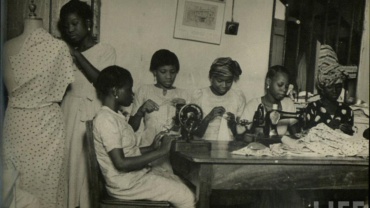In the mid-1950s, as Ayetoro grew from a fledgling settlement into a thriving community, education became one of its proudest achievements. At the heart of this vision stood Ayetoro Primary School — a modest wooden structure with open windows and a sandy yard, where the laughter of children rang out each morning. To the Apostles, education was not a luxury but a duty. They believed that the future of the Happy City depended not only on faith and hard work but also on knowledge passed to the next generation.
Archival photographs capture the simplicity and joy of those early classrooms. Rows of children sat on wooden benches, slates in hand, their faces turned toward a teacher who wrote carefully on a blackboard. Some came barefoot, their white garments neatly pressed, others carried books tied with string. Outside, the sea breeze drifted through open shutters, and the sounds of waves mingled with the recitation of the alphabet. For the children of Ayetoro, learning took place not in grand halls but in an environment shaped by both nature and community.
The curriculum was as practical as it was academic. Pupils learned reading, writing, and arithmetic, but they also studied hymns, discipline, and the values that defined Ayetoro: honesty, equality, and service. Oral testimonies recall how teachers emphasised communal responsibility, reminding children that their education was not for personal gain alone but for the uplift of the entire settlement. Boys and girls learned side by side, embodying the Apostles’ belief that every child deserved the same opportunity to grow in wisdom.
Daily routines often began with morning prayers and songs. Children stood in neat lines in the schoolyard, raising their voices in hymns that echoed across the lagoon. Inside the classroom, discipline was strict but fair. Elders describe teachers as role models who balanced authority with care, often extending lessons beyond academics to include guidance on how to live responsibly within the community. For many pupils, these lessons shaped not only their minds but their character.
Market days and fishing seasons influenced the rhythm of the school year. Sometimes children helped their parents in the mornings before hurrying off to class, their hands still smelling of salt and fish. Yet, attendance remained a priority, for parents knew that education was key to securing Ayetoro’s future. The community pooled resources to provide supplies, and no child was left behind. As one elder remembered: “We did not see school as just for our own children. It was for the children of Ayetoro.”

Visitors to the town often remarked on the pride parents took in seeing their children in school. In an era when many rural communities lacked access to education, Ayetoro stood out. The sight of eager young pupils, sitting attentively with slates and chalk, symbolised the settlement’s progressive spirit.
Though much of the physical school has been lost to erosion, its memory remains vivid. The children of Ayetoro Primary School went on to become teachers, traders, and leaders, carrying the lessons of those early classrooms into the wider world. Their story is a reminder that even in a town built on water, the strongest foundations were laid in education.




